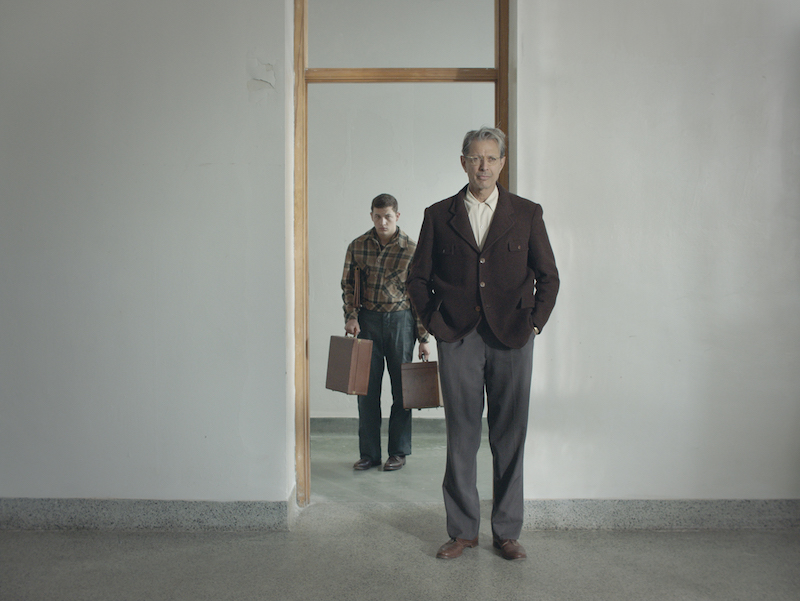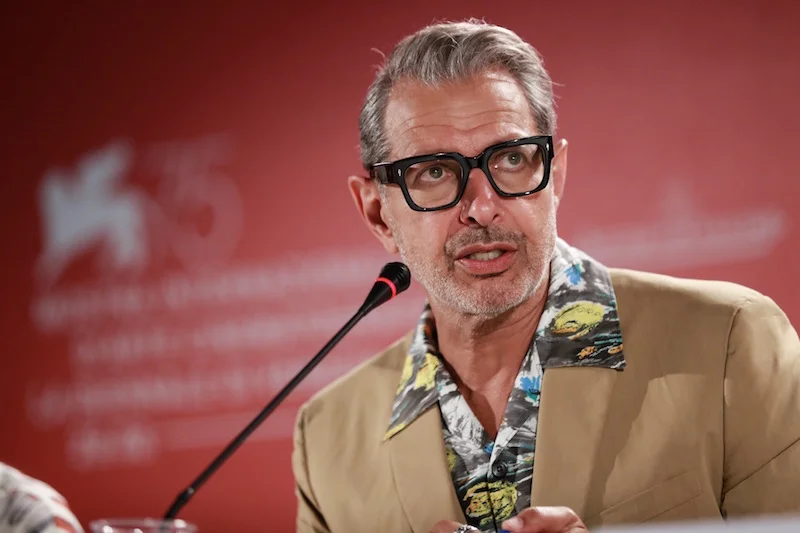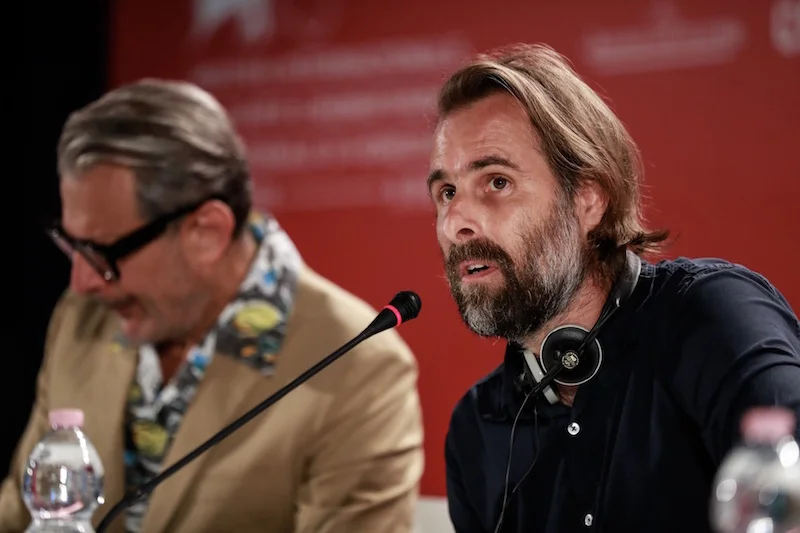Filmmaker Rick Alverson has never made films that are easily comprehensible to an audience. His work is the antithesis to the American superhero movie. From his first oeuvre 'The Builder' in 2010 he's proudly yet quietly worn the "independent filmmaker" badge of American moviemakers. In the tradition of greats like Dennis Hopper and John Cassavetes who've come before him.
In his latest film 'The Mountain' which premiered in Competition at this year's Venice Film Festival, Alverson throws the audience a proverbial bone. What I mean is that 'The Mountain', starring Jeff Goldblum and Tye Sheridan, is as close to a traditional film as we will ever get from Alverson. While he still describes it as "an anti-utopian film" in his director's statement, 'The Mountain' takes the audience through a hippie trippy ride on a sparse, pastel and wooded hued rollercoaster with few words, great acting, haunting images and eerie sounds. And by the end, he leaves us feeling lobotomizes. I could swear the entire crowd of the Sala Darsena, where the press and industry screening took place the day before the film's official premiere, walked out with a very specific look on their faces. Not unlike that of the leading character Andy, played so perfectly by Sheridan.
So where do we go now, after having watched 'The Mountain'? Personally, Alverson's vision made me re-evaluate the way I look at my own American culture. In this age of President Trump monopolizing our discussions, media and thoughts, aren't we much like Andy, and our leader like Goldblum's character Dr. Wallace Fiennes, who craves fame yet masquerades it as aiding/leading others in the process? When Goldblum talked about the inspiration for Dr. Fiennes, infamous lobotomist Walter Freeman, he said Freeman "wanted to help” yet he also, “in the American way, wanted to make a name for himself.” Bingo!
Another brilliant way in which Alverson pushes us to reevaluate the ideals and sense of normalcy and perfectness that has been installed in us, as part of the American dream, lies in his choice to set the film in the 1950s. A time that is at once the best or the worst in American history, depending on whether you look at it as a white male or as an African-American or as a woman. Most of those trapped in the institutions that Dr. Fiennes visits with his new apprentice photographer Andy are either women or African American in fact. Those less likely to conform to the standards of society, those who don't look like the "norm" -- those most likely to rebel and be "the Other".
'The Mountain' is not a film you should watch if you are afraid of asking questions or, worse, if you can't deal with the answers you'll eventually come up with. It's a film that gets better with time, it sits within the crevices of your inner thoughts and gains momentum once you know more about the actors who inhabit the characters as well as their visionary filmmaker. Following are just a couple of excerpts from a conversation with Jeff Goldblum, Rick Alverson and Tye Sheridan in Venice -- interviews conducted inside a room within the Excelsior hotel that seemed strangely similar to the setting of one of the clinics in 'The Mountain'.
Tye Sheridan, photo courtesy of La Biennale di Venezia, ASAC
Tye, how difficult is it to play such a silent, passive character?
Tye Sheridan: It depends, because there is this one fear that everybody had in making this movie -- can we have a protagonist that is primarily silent throughout the film? And we’re still going to feel engaged by, still tethered too and like he’s alive inside? I think Rick is very good at composing that and finding out how to keep this tetherment between the character and the audience and I think largely it’s because his experience through the journey of the film is also parallel to the audience’s journey of watching this movie. If you think about it, he’s [Andy] this kind of open face, a receptor for a lot of these ideas, for these radical characters and instances that are happening around him in this radical era of America. I think there is an internal curiosity, wrestling questions inside that we all have while watching this movie which is why I think the passive character, even if he doesn’t have dialogue, still has engagement.
How do you prepare for that in your craft, how do you arrive at that character?
Sheridan: There is so much happening around him that it doesn’t seem that odd… There is an ebb and flow. You have Wallace Fiennes, Jeff Goldblum's character is obviously very vocal and present, so I think it’s a nice balance. I guess I thought about the passivity of the character but I didn’t think much about the silence. Instead of thinking about the silence you should think about the thoughts that you’re not hearing.
Jeff Goldblum, photo courtesy of La Biennale di Venezia, ASAC
Jeff, what attracted you to this project?
Jeff Goldblum; I was fascinated by the themes it involved about America and a kind of critique about American personality and difficulties and challenges throughout its history, illustrated most poetically, as Rick thought, in that period and those events.
Is your Dr. Fiennes a believer or a charlatan?
Goldblum: Both. I think he’s struggling with who he is and what he’s up to and what he’s done. What my guy and the real guy [Freeman] are doing at this point, when they’re discredited, is shoring up their legacy, teaching more people to do it.
There is this sort of fixation which we have in America, that we have to be normal — normalcy, what is considered "normal". And that’s what it questions for me, your character is kind of like a cult leader. This idea of how to make it all perfect. And how do you make it all perfect?
Goldblum: Hopefully we keep evolving and getting more refined and smart about the answer to that question. But we had a primitive and secret, dark past where those questions were badly answered and ignorantly thought of. I think my guy had some primitive view of the cultural norm and what it should be and his grotesque vision of it.
I think he also was in line with the snake-oil salesman/showman which is kind of an American thing, P.T. Barnum and those people who would sell what they knew to be not particularly… but they wanted to make a buck! There are still people who want to — by hook or by crook — make a buck. That’s been the American way, in some ways, if you read Arthur Miller’s ‘Death of a Salesman’ a critique of that is in there.
So yes, he was part showman too, he enjoyed showing off his charm and charisma and coming in and being a cultish kind of figure who would enroll people in a newfangled, “brand new” -- as people put on their product often in America -- way.
I was also going to say that overlaps with the character that Denis Levant plays who is a real cult leader. He’s up to New Age spiritual things and selling his wares to vulnerable people looking for something. I myself over the decades I spent in California in the 70s have had exposure and brushes with that type of thing.
Rick Alverson, photo courtesy of La Biennale di Venezia, ASAC
Rick, this idea of wanting to make everyone normal, and standardizing people as the Jeff Goldblum character attempts to do with his procedure, is very American…
Alverson: Yeah… It is uniquely in the American brand. I’m part of an America that came from Europe and it’s recycled back and distilled and deformed in these attributes and messages and then sold to the world as an ideal, as a brand. You’re right, there is this idea of a digestible uniformity and cleanliness of message and compactness of delivery systems and devices and the convenience. That’s what I think, America being a nation of immigrants it’s come in and been distilled and anesthetized and shot back out as this antiseptic utopia. I don’t want to be part of that compact, conveniently digestible clean engagement, I think that’s a problem. Diversity is coming to America in a big way and that’s overdue.
Were you ever afraid of taking Goldblum away from the kind of enlightened, cool man character he usually plays, with his portrayal of a soon-to-be-obsolete lobotomy doctor?
Alverson: Jeff Goldblum is like this living breathing, you know, attentive joyful organism and I think that to take that and put a pillow over it and hear the muffled cries of that vital intelligence seemed exciting.
He’s so talented it was great wresting with that in the performance, it was exciting.



